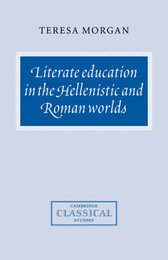
|
Literate Education in the Hellenistic and Roman Worlds
Hardback
Main Details
Description
This book offers a new assessment of the content, structures and significance of education in Greek and Roman society. Drawing on a wide range of evidence, including the first systematic comparison of literary sources with the papyri from Graeco-Roman Egypt, Teresa Morgan shows how education developed from a loose repertoire of practices in classical Greece into a coherent system spanning the Hellenistic and Roman worlds. She examines the teaching of literature, grammar and rhetoric across a range of social groups and proposes a new model of how the system was able both to maintain its coherence and to accommodate pupils' widely different backgrounds, needs and expectations. In addition Dr Morgan explores Hellenistic and Roman theories of cognitive development, showing how educationalists claimed to turn the raw material of humanity into good citizens and leaders of society.
Reviews'Teresa Morgan's excellent analysis fruitfully juxtaposes the literary sources with the 'schooltext' papyri which offer a direct (if not unproblematic) source for educational practice in Hellenistic and Roman Egypt, and reveals subtle differences of detail.' The Times Literary Supplement
|